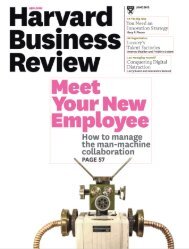+ + +
Create successful ePaper yourself
Turn your PDF publications into a flip-book with our unique Google optimized e-Paper software.
ILLUSTRATION © MARK SMITH; PHOTO © SHUTTERSTOCK/MIHALEC<br />
Disagreements over salaries can<br />
stall a business right out of the gate, so<br />
it’s important to get on the same page<br />
before anything is formalized.<br />
“Discuss the expectations of the<br />
parties,” Steinberger says. “What type<br />
of personal overhead does each party<br />
have to have? Is each party willing to<br />
take less money out of the business<br />
to help it grow? From there, you can<br />
execute employment agreements, which<br />
provide for a base salary and allow<br />
for quarterly or semiannual distributions<br />
or commission income to be tied<br />
to performance.”<br />
Financial infidelity is more difficult.<br />
Suspicions that your partner is stealing<br />
money from the business can be<br />
devastating. However, accusing your<br />
partner of the act, while failing to<br />
establish and document the allegations,<br />
could result in defamation claims and<br />
create a highly contentious relationship<br />
going forward.<br />
To avoid this scenario, create a<br />
process of checks and balances wherein<br />
one partner oversees the day-to-day<br />
accounting, while another is responsible<br />
for account reconciliations, including<br />
(but not limited to) banking, credit<br />
cards, trust accounts, accounts receivable<br />
and accounts payable.<br />
When you enter into a<br />
business partnership,<br />
you’re literally tying your<br />
fortune to that person.<br />
It’s important to discuss<br />
your perspectives on<br />
money upfront.<br />
You can also prevent fraud by<br />
requiring dual signatures on checks<br />
that exceed a specific amount and/or<br />
establishing limits on bank withdrawals<br />
or credit card transactions.<br />
Most important: If you and your<br />
partner truly want to put your trust<br />
in one another, conduct comprehensive<br />
financial background checks. Poor<br />
credit scores, tax liens, judgments<br />
or bankruptcies are all red flags that<br />
need to be discussed before signing<br />
any agreement.<br />
STEPH WAGNER IS A PRIVATE EQUITY<br />
INVESTOR AND A FINANCIAL STRATEGIST<br />
FOCUSED ON GUIDING WOMEN TO FINANCIAL<br />
INDEPENDENCE. @STEPHLWAGNER<br />
| VC VIEWPOINT |<br />
Great expectations<br />
Create value—not just buzz—for your customers<br />
By Sam Hogg<br />
A<br />
s an active investor in agricultural technology, I hear pitches from startups that<br />
have found ways to make crops bigger, stronger and more resistant to pests,<br />
usually through some proprietary formula or advanced biotechnology.<br />
I always challenge these folks with a little drill. I tell them there is an item on the<br />
table that can do the exact same thing, and I point to my glass of water. I explain<br />
that more water can make plants bigger, stronger and more resistant to pests; more<br />
fertilizer can, too. But farmers don’t use excessive water and fertilizer because of wellknown<br />
diminishing returns.<br />
This is the point where we begin to have a constructive talk about value, and<br />
whether the whiz-bang product being pitched truly has the potential to add it.<br />
To customers, value is the difference between what they perceive and what they pay.<br />
For a farmer, this new super-product needs to return more profit than it costs, but it<br />
has to do sufficiently better than well-known and completely de-risked options such as<br />
additional water and fertilizer. Doing something because it’s new or supposedly easier<br />
simply doesn’t cut it—you have to keep growing value to be sustainable.<br />
There are many ways to do this. Henry Ford didn’t invent the automobile, the<br />
assembly line or the conveyor belt. He did combine them, however, and drove down<br />
the time it took to build a car to 93 minutes. In doing so, he created a cost curve and<br />
customer value spread that revolutionized an industry.<br />
Conversely, the price of an iPhone has never gone down, yet sales have climbed with<br />
each new model. Apple creates a value spread not by reducing costs, but by adding<br />
features that make buyers feel they are getting more with each version.<br />
Too often I see startups focus on their cost curves so much that they neglect the<br />
most important goal: determining why someone would want to buy what they’re<br />
selling. A business needs to show that there is a compelling reason to buy its products<br />
and to keep buying them for a long time. Once companies figure that out, the cost<br />
curve takes care of itself.<br />
If you find yourself pitching your company to a VC like me, don’t be surprised if I<br />
spend more time discussing your customer than I do learning about you. Successful,<br />
sustainable companies are the ones whose leaders know more about their customers’<br />
economic expectations than their own. That’s the value proposition I look for—and you<br />
need to prove you can deliver it.<br />
SAM HOGG IS A VENTURE PARTNER AT OPEN PRAIRIE VENTURES. @SAMHOGGVC<br />
MARCH 2015 ENTREPRENEUR 61






